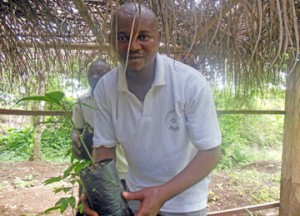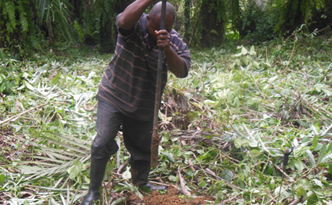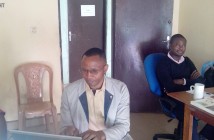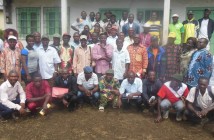“We were facing difficulties in getting plants like mango, kola nut, bitter kola, plums and timber, but with this project, we see Manyu division transforming into an agricultural society in the next 20 years.” This is the statement of Ayuk Humphrey Tambe, a man from Bisongabang, who volunteered to steer an agro-forestry project in his village.
Since 2013, he and other volunteers have been active in ensuring that their villages receive, plant and care for seedlings.
He is speaking at the volunteers meeting, which regularly takes place at the main nursery in Nchang village, and brings together representatives from 11 villages in Mamfe Central Sub-division of Manyu division.
The project was initiated by the Environmental Governance Institute (EGI), with the support of the Rufford Foundation, and it has been facilitating the acquisition and distribution of seedlings for the past 15 months.
“My role as a volunteer in the agroforestry project is to help other farmers to easily cultivate njangsang, bitter kola, kola, mango, bush mango and plums, among others,” says Emoh Daniel Emoh, another volunteer from Okoyong village.
To facilitate this role, volunteers were trained by foresters. Among other things, they learnt the importance of tree nurseries for agro-forestry practices, how to select seeds, create nurseries and care for nurseries. “We have learnt a lot. Previously we were just planting, but we now know there are dimensions and demarcations, the distance from one tree to another,” says Emoh.
During their meetings, hosted by the community resource person Mr. Stanislaus Takangeyong at the main nursery at Nchang, they also get an opportunity to discuss their progress, share ideas on how the project should run and share some of the responsibility of caring for seedlings before actual distribution takes place.
 So far, the villages have received njansang (Ricinodendron heudelotii spp.), orange (citrus spp.), cola (Cola vera, Cola acuminata, Cola nitida), bitter cola, bush mango (Irvingia gabonensis), mango (mangifera spp.), and monkey cola. Meanwhile, three species of timber trees have been nursed and distributed to the participating communities. These include doussie (Afzela spp.: Afzelia bipidensis, Afzelia pachyloba); njabe (baillonella toxisperma) and Azobe (Lophira alata).
So far, the villages have received njansang (Ricinodendron heudelotii spp.), orange (citrus spp.), cola (Cola vera, Cola acuminata, Cola nitida), bitter cola, bush mango (Irvingia gabonensis), mango (mangifera spp.), and monkey cola. Meanwhile, three species of timber trees have been nursed and distributed to the participating communities. These include doussie (Afzela spp.: Afzelia bipidensis, Afzelia pachyloba); njabe (baillonella toxisperma) and Azobe (Lophira alata).
The regent chief and volunteer of Mfaitock II village, Eyong James Tabot has high ambitions for his village. When they received their share of seedlings, their action was quick and decisive. “We have planted our own seedlings, we prepared the site, and the project is welcome,” he explains. The village has planted the seedlings in their community farm.
Out of the nine villages which have collected seedlings, his is the only one that has used community land, while the rest have distributed seedlings to individual farms. Although Eyong is thankful for the seedlings his village received, he has grand plans, and he does not hesitate to state what his village needs to ensure that these plans are realized.
“Usually, seedlings like bitter kola are very scarce to get. I am not happy about the quantities you have given us because they are few. We need more, because we are really committed to the project and have prepared enough space on our site for planting,” he says. Others like Ayuk say they would like more bitter mango and bush mango seedlings.
They may have a point. Large areas have been set aside by villagers, and the seedlings supplied in the pilot phase were insufficient to cover this need. In an effort to establish viable supply structures, EGI has committed itself to train community members on selecting healthy and viable seed, establishing village nurseries and setting up mechanisms to manage and distribute these seedlings all across their villages.
“A village-based approach with community seed-banks will be more sustainable in the long-run. Participating village communities will be able to nurse the type of trees that are most in demand, and it will reduce the hurdles of transportation, so villages such as Eshobi and Eyang-tui, which have not been active because of bad roads, will be better served,” John Takang, the EGI Executive Director, comments on the plans for the next phase of the project.



